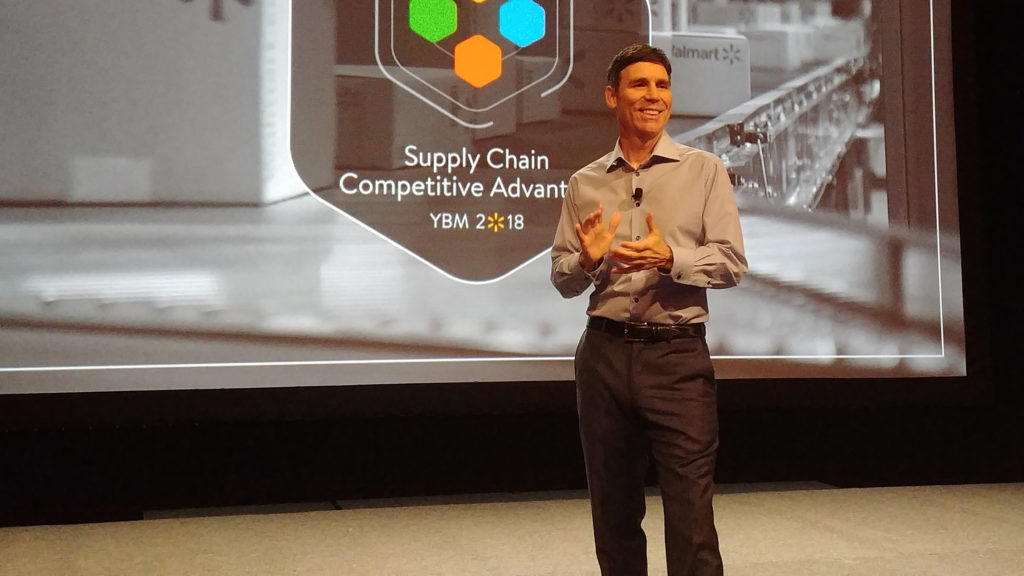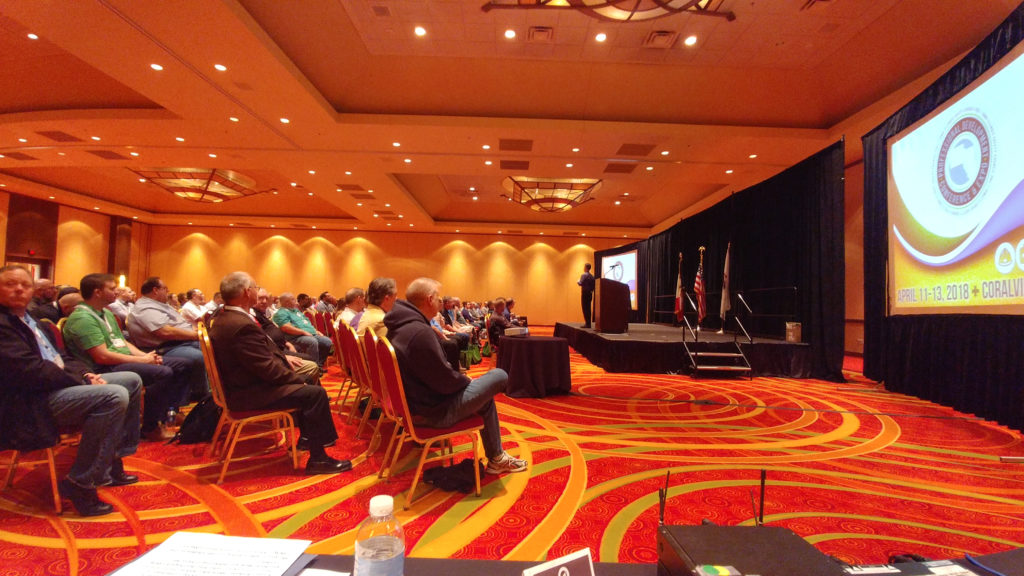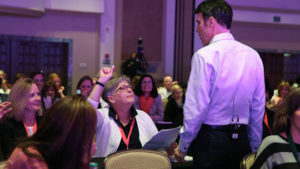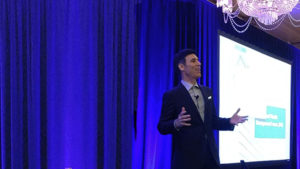Generational Differences Keynote Speaker Garrison Wynn, CSP
Garrison Wynn’s research-based keynotes for managing a multi-generational workforce include essential tools and knowledge to help managers attract and motivate younger workers.
His extremely informative programs won’t offend or demean any age group. The research makes sense to all generations, so buy-in from leaders is quick and the solutions you implement have an almost immediate impact.
Generational Differences Keynote Descriptions

The Real Truth About Generational Differences
When relating to younger crowds, people love to say “I was young once.” The truth is, “No, you weren’t!”—at least not in a way that compares with today’s youth. You were young whenever that was, which is not now. And younger workers, you might occasionally hear about your attitude of entitlement, as though you somehow did this to yourself!
Despite the friction that can arise when generations misunderstand each other, intergenerational teams are simply better at getting the job done. Grounded in behavioral research, this entertaining session reveals how and why this is so.
Segments include:
(1) real tolerance (true acceptance), (2) understanding each generation’s peculiarities and (3) how each generation’s contributions heighten a team’s success factor. A multigenerational audience will be amused, enlightened and, best of all, equipped with solutions that make an immediate positive impact. Available in leadership and team versions.

Attract, Manage, Motivate And Keep Younger Workers
Some employers struggle to attract talented workers under age 30, and still more find it challenging to get these Generation Y employees to achieve its best. Then, just when managers stumble upon methods that seem to motivate, they leave for more attentive management elsewhere. Wynn Solution’s new, research-based program reveals what type of business image and work environment will entice the best young workers, which modern management techniques will keep them motivated, and which incentives will keep them from defecting.

Millennial Loyalty
Keeping And Attracting Top Young Talent
People in their 20s don’t want what their parents wanted from a job. They are also more likely to live at home and less likely to put up with a work environment that cramps their style. What a shift in mindset! Attracting the young people needed to replace your retiring workforce (and making sure they stay long enough to make a difference) is crucial for your organization’s future. This entertaining yet heavily researched program shows business owners, leaders and managers how to adapt their organization into a company young people want to work for and how to establish a culture they do not want to leave. Besides actually having a work force 10 years from now, the benefits include improved performance and heightened accountability from the millennials who represent your company’s future.

Business Etiquette For Generation Y
Your new young hires sure know their way around PowerPoint and PDAs, but their habitual typos and cryptic e-mails stump clients and stagnate your business. From customer encounters to business dinners to effective writing, the under-30 set often lacks the experience needed to put the company’s best foot forward. With humor but without condescension, this session delivers pointers on professionalism and emphasizes business etiquette among a generation that values self-expression over corporate expectations.

Generations Working Better Together
This extremely informative, entertaining, solutions-based keynote explores why younger and older people don’t see eye to eye and what to do about it in the workplace. From pointers on motivating, managing and retaining younger employees to ways of preventing older managers from losing their minds, this research-based program shows it’s possible for baby boomers and Gen X and Y employees to work well together.
SUGGESTED SEGMENTS
The under 30 workforce Generation X on steroids: high-performance, high maintenance and a strong sense of self-worth
- What we think of younger people: Opinions, assumptions and work ethic
- What they think of us: Misguided, work-addicted and slow
- Understanding what happened: A change in parenting and the elementary school system
- Generational stereo types and categories: Millennial’s, Gen X, Baby boomers and Traditionalist
Being effective with older workers: Lessons of the young leader
- Being viewed as the punk-manager: Big mistakes you don’t have to make
- What older employees need from their younger bosses
- How older workers feel about changing technology and systems
The big mistake: Wishing they were like us
- A lack of strategic thinking: Older and younger generations
- Knowing what you cannot change
- You were never young once: You can’t walk in another generation’s shoes
Building an effective relationship quickly: What’s working and what’s not
- Asking the right questions
- Knowing what they value
- Making sure you see their value
- Turning talent into performance
How older and younger employees view goal achievement (20’s, 30’s, 40’s, 50’s, 60’s)
- The difference between talent and skill
- Are you doing all you can to improve performance
Coaching social skills in younger employees
- A question of respect: The rules have changed
- You can’t be influential unless you know what someone values: Finding out what’s important
- What younger generations deem irrelevant
- We are living in their time: Acceptance and coping skills
When was your time
- Getting over the hump: A very difficult truth
- Doing what works for everyone

Garrison was everything we asked for in a keynote speaker and more. Not only did he engage and energize the crowd; he got a standing ovation and connected with them on their level. He delivered a laughter-filled keynote address with a powerful message. I loved the way he spoke to every meaningful objective and brought new material that was relevant to the event. Fantastic! Couldn’t be happier.
American Express

Garrison recently spoke at our MassMutual Academy for almost 800 Financial Advisors in Phoenix, AZ. Garrison’s energy, passion, endurance and connection with the audience was beyond impressive. His message was relatable and his humor kept the audience’s attention for the entire presentation. He was the perfect choice for a closing speaker after a 4 day learning conference for our group. From the moment he came into the room to the moment he left the conference his focus was on our attendees and his professionalism did not go unnoticed. Our attendees left his presentation energized and excited about his message and his performance. We have already received a tremendous amount of positive feedback on Garrison’s presentation and many General Agents want to hire him for agency presentations. Garrison hit it out of the park! – MASS MUTUAL


Garrison was a hit with the 400 members of Generation Y attending the conference. The reviews were wonderful. The audience enjoyed getting a leadership message in an entertaining way, with research behind the theories and thoughts. Garrison was able to relate to our audience and keep them engaged while conveying important messages essential to their future success. We would highly recommend Garrison Wynn, and will certainly be using his services again for future conferences.
– Lockheed Martin

Generational speaker Garrison Wynn’s presentation was exciting, energizing and humorous, while effectively communicating real-life, hard-hitting and no-nonsense solutions to problems we all face in our day-to-day businesses as a result of generational differences. Garrison’s impact was evident from the beginning of his presentation to the very end – everyone was listening intently or taking notes throughout his entire program! Garrison received the highest marks you can get on our post-conference survey – 5 out of 5! Everyone thought he was awesome – “Funny, informative, credible, talented and on point! (PDCA Member response to survey) – Pile Driving Contractors Association
When Baby Boomers And Employees In Their 20s And Early 30s Work Side By Side, The Generation Gap Can Look More Like A Canyon.
Employers Can Do More Than Just Stand By And Watch As Crisis Looms.
EFFECTIVE SOLUTIONS DO EXIST!
STRATEGY
Create repeatable processes for bringing Millennial employees on board and keeping them.
STRATEGY
Get customized programs for your industry so you can gain the tools to reduce generational conflicts and improve productivity.
STRATEGY
Implement management and business etiquette programs to groom future leaders and get younger workers ready to represent your organization with the professionalism you need.
WHAT’S WORKING
Motivating Generation Y by understanding why they think and feel the way they do and using that information to influence them.
WHAT’S WORKING
Trying to make them act like you! Wynn Solutions’ research shows you can’t make a 25-year-old think like a 45-year-old. You have to work with young employees by meeting them where they are, not where you wish them to be.
In Today’s Corporations, Generational Differences Jump Out At Managers:
One generation of employees exhibit maturity and steadfast loyalty, while workers of a younger generation who show brilliance and application have an exit strategy ready if boredom or dissatisfaction sets in.
Population booms and generational differences in mindset combine to create adverse conditions that will gradually worsen, creating a perfect storm that can spell disaster for employers.
CONSIDER
- 50 percent of the American workforce will retire within seven years.
- 67% of Gen Z and 55% of Gen Y say they plan to leave their current job in 2 years.
- Many managers lack the skills needed to motivate and retain talented younger employees.
- Unable to attract young people, some industries run the risk of being unequipped to compete in the future.
What Makes People Under 30 The Way They Are?
The elementary school system changed how teachers taught and rewarded for accomplishment. Teachers praised students along the way to the goal, not just when a task was completed. They stopped to celebrate along the way to success, creating motivation through little rewards rather than a big reward at the end. The teachers also promoted self-esteem by making sure every child knew he or she was cared for regardless of accomplishments. The recurring message delivered through this approach goes like this: “We love you; we know you can do it; and here is a little prize at the halfway mark to prove that to you.” This under-30 group is shaped by more than just the educational process; they also grew up in the most affluent society the world has ever known. We gave them a lot and told them they could have anything they wanted in life. Now, the under-30s are here to collect! The bottom line: We did it!
So What’s The Good News About The Under-30 Set?
The majority of workers in this group are very capable and committed to each other. No generation has ever had the loyalty to each other that this group possesses. They work well in teams and achieve remarkable results in record time if managed effectively. It’s true that they want to do this wearing flip-flops, but the results we have seen from the well-managed are impressive.
Each generation, it seems, is uniquely suited for the evolving world it will inherit. If you watch the news these days, you hear the latest reports on celebrity rehab alumni as the words scrolling across the bottom of the screen give you the death toll in Iraq. Who can make the most of a world like that? They can! The under-30s have no problem with it; over-informed and underdressed, they will navigate the busy future with ease.
What’s Up With The Over-40s? They Seem Kind Of Stressed Out!
The over-40 group was raised to believe that working hard is proof of commitment (in reality, you can bust your butt and secretly hope the company goes under so you don’t have to quit). Also, they think working late proves that you are working hard. They think that leaving before 5 p.m. means you are not management material, while the under-30s believe that working until 8 p.m. every night just means you lack time management and life balance. The under-30s grew up in families where Mom or Dad or both, always worked late.
Additionally, most research shows the over-40 males believe they are what they do for a living. In one interview, I asked a 49-year-old salesman who he was when he was not working. He said, “Well, mostly, I am always working. But when I’m not, I guess deep down inside I’m a relationship.
How Can We Get More Productivity From The Under-30 Group?
Wishing people were like you is not a strategy. You have to motivate the under-30s the way they grew up being motivated. They need to be praised along the way to the goal. Celebrate the small victories on the road to success and quit telling these workers about five-year plans; their plan in five years is to have a new plan. This plan most likely will not involve you or your company (no offense). Give them short, tight deadlines and make sure your objectives are not hindered by low-tech tools. If their computer at home is twice as fast as the one at work, they have a crummy job. And most important, they want to do a good job and get a reward in the first week. Make sure you have a system that will allow that to happen. And finally, if thinking about these tips is causing you to lose the will to live, remember that our society created these people so now we have to make sure they can get the job done.
How Can We Get The Over-40s To See We Can Do The Job Much More Effectively If They Would Let Us Do It A Little Bit Our Way?
Let them know you understand the old way first. If you have an innovative new system and you fail their little quiz on the old one, you’re toast. Also, make sure you seek their counsel. If you are 27 and your coworker is 41, you need to make sure he knows that you know that his experience is an asset to your decision-making process. I was a department head at 27 years old with 35 direct reports who were all in their 30s and 40s. I did not heed this advice personally in those days so my nickname was “Punk-boy manager.” It’s hard to wield authority with that label floating around the office. What the over-40 group really wants from you is gratitude and respect. If you can fake that, you’ve got it made!
What Do We Need To Do To Work More Effectively With Each Other As A-Team?
Get over yourselves! People who grow up at different points in history have a unique experience and outlook toward life. It’s always been that way and will most likely continue. And though these differences seem a bit greater than some in the past, they are in effect natural. We have already established in the past 30 years that dealing with diversity and understanding each other’s differences is critical to communication and success. So, letting people be who they are and dealing with it is not new. It’s easy to say, “We were all young once” but the truth is we were not all young under the same circumstances. Case in point: When I was in high school, sex wouldn’t kill you and no one told me I was responsible for the environment.
One day the under-30 group will grow up (soon, I hope) and will face a new crop of young people. They will be saying things like “What do you mean we can’t come to work naked? It’s natural. And besides, global warming has made clothing irrelevant!”
Tips for Understanding Generational Differences:
Generation Y, Generation X and Baby Boomers
Generational difference #1: Work-life balance
Workers in their 40s will stay late to get the job done. Workers under 30 (and even in their mid-30s) want to leave at 5 p.m. but they WILL work from home. They stay connected and online 16 hours a day consistently and they will mix leisure time and work duties together.
Gen X (workers in their 30s) follow the rules although they may resent it. They’re willing to work hard and often, stay late, but they are also torn up about the kids. They want to spend more time with them than their parents did, and juggling the two is getting more and more difficult. Everybody wants work-life balance but these groups view it differently.
Generational difference #2: Generation Y and Getting Things Done
Younger workers like to test an idea or theory before implementation. They will look for online solutions and gather a lot of information before making a decision. This causes managers in their 40s and 50s to think they are not action takers. “Hey, why doesn’t someone pick up a phone and get something done around here! They wonder.”
Generation difference #3: Generation Y and Dress Codes
Dressing casually for workers under 30 is a very big deal. They don’t understand the concept of dressing up if they are surrounded only by their coworkers and supervisors. Some younger male workers have indicated they’re not interested in jobs that require a suit and tie. Dropping the dress code when possible is yielding amazing productivity results.
People under 30 were rewarded in elementary school and beyond, regardless of accomplishments. (Everybody gets a trophy.) They expect rewards and recognitions that are not necessarily achievement-based. People under 30 grew up being corrected with an explanation that they were not that far off and that the teacher-supervisor has faith in them and their abilities. So, in the workplace, they respond very poorly to military-style management being told that what they are doing is completely wrong.
People under 30 and to some degree, people in their mid to late 30s (Generation X) believe very strongly that history does not play a part in the future. They seem generally not interested in historical events, old processes or how things were done a long time ago. Growing up with computers in school has taught them there is always a new way to solve a problem and you don’t have to know the root cause to solve it effectively. That is why older managers lose their cool in meetings when young employees disregard the cause of a problem and move right on to solutions.
Television has played a very large role. With shows like “Leave It to Beaver” and “The Brady Bunch,” the script formula always showed the kids at the end of the show apologizing to the parents after learning a lesson from them. Later television programs from “The Facts of Life” to “Hanna Montana” show a pattern of the parents always apologizing to the kids. This obviously was done to improve ratings among children (everybody wants to watch a show where characters from their demographics are the ones in the right). But it created generations (Generations X and Y) that did not see older people as wise just because of their years.
People under 30 do not respect people because of their age, knowledge or position. They respect only those who they believe (for whatever reason) respect them. So people who manage younger workers have to hold themselves accountable in front of their employees to effectively hold their younger team members accountable. While this puts managers under heightened scrutiny, it works extraordinarily well and allows leaders to create a powerful culture of accountability.
Articles
Tools for managing a multigenerational workforce






